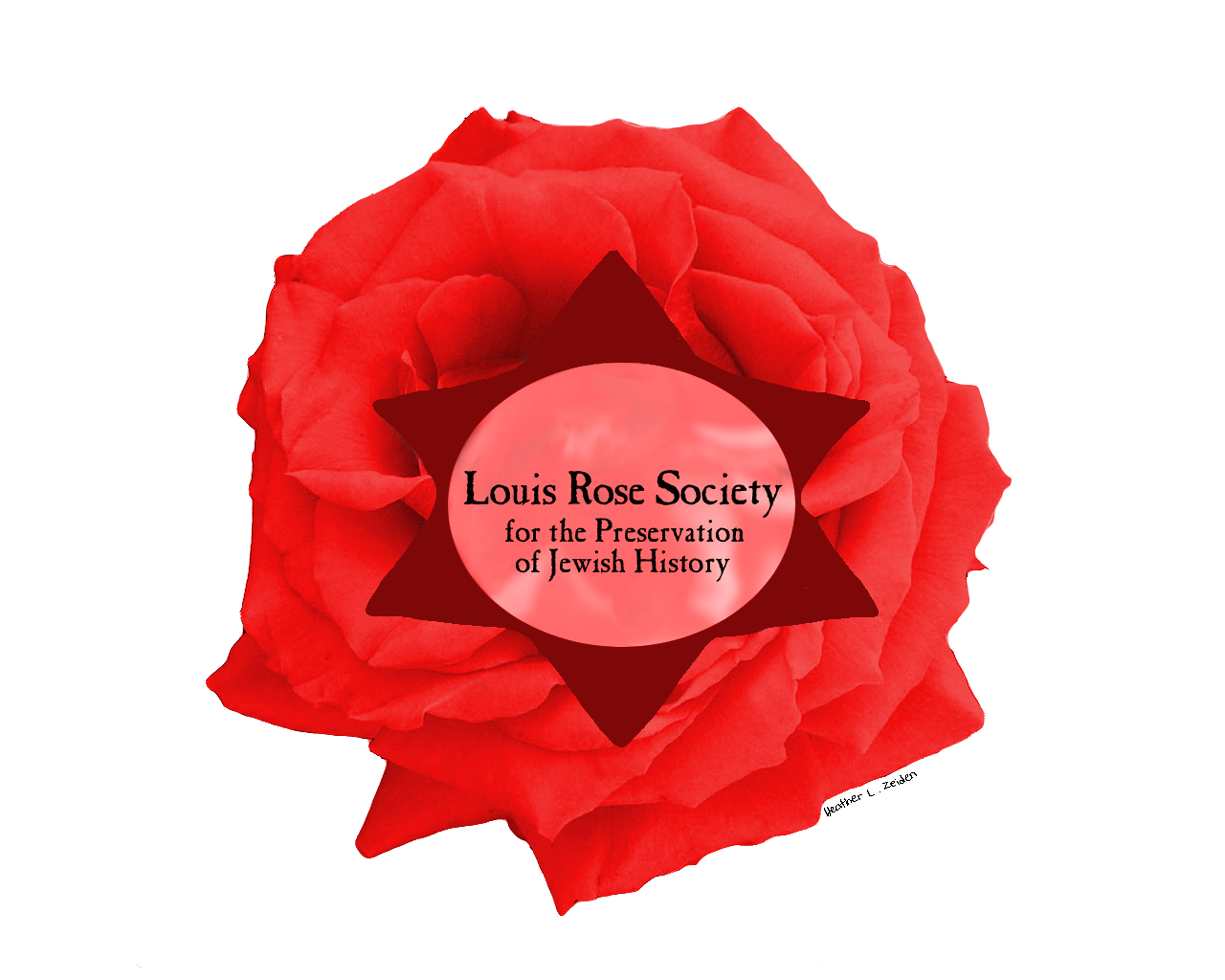|
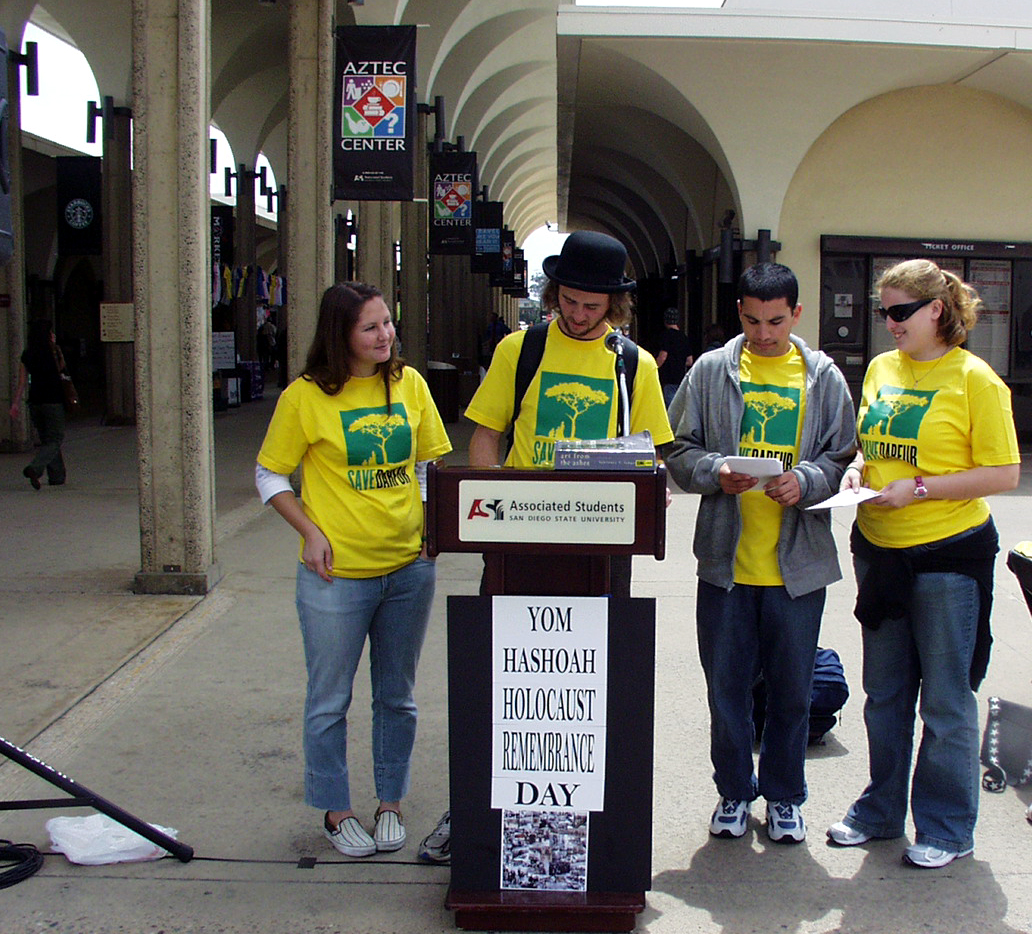
SHOAH ROLL—Trevor
Witt of the Jewish Student Union at San Diego State University reads names
of victims of the Holocaust as fellow students, from left, Aimee de Saxe,
Amir Baum and Liora
Schneider lend moral support. The Holocaust roll was read from 10 a.m.
to 2 p.m. on the Free Speech
Steps of Aztec Center in observance of Yom Hashoah. The students,
wearing "Save Darfur" T-shirts
also passed out literature urging fellow students to write and call Congress
and the President to back
the creation of an international police force to stop the wanton killing in
the Darfur region of The Sudan.
Saxe said such action will demonstrate that "Never Again" is not just a
slogan, but a commitment to
action to prevent genocidal campaigns, wherever they may occur. {Donald H.
Harrison Photo}
____________________________________________________________________________
Aggressive Iran provides new
incentives
for Arabs to make peace with Israel
By Rabbi Dow Marmur
JERUSALEM—After a long initial period of relative
silence about the
Holocaust, it became prominent in Israeli consciousness
around the time
of the 1967 War, when the Jewish people feared another
catastrophe of
Holocaust proportions. Since then Holocaust consciousness has
become
progressively stronger. It has probably never been as strong as it is
today,
if not in the Diaspora then definitely in
Israel.
The fear of a nuclear Holocaust emanating from Iran may
be the main reason.. There is an underlying sense of, at best, great
discomfort, but
more likely, outright fear. Holocaust Memorial Day on Monday
provided Jews in Israel with an opportunity to express some of it.
Though the above sounds very grim, it also contains a
message of considerable|hope. For the threat from Iran, though ostensibly
aimed
at the Jews, is, of course, affecting in equal measure all the peoples
in
the region. Nuclear devices aren’t sufficiently selective to target Jews
wearing a yellow star. Not only are Israel’s Arabs and the neighboring
Palestinians as much under threat as Jews, but most of the countries
in the
region have become extremely vulnerable. They know it.
That’s how we must understand the recent revival of the four-year old
so-calledSaudi peace initiative, which has now been adopted by the Arab
League. The Arab states have rightly concluded that peace with Israel
couldchange the face of the Middle East and neutralize Iran. The invitation by
the Arab League to talks between their emissaries and representatives
of the
State of Israel must be seen in this light. Though it’s not yet on the Prime
Ministerial level, commentators here suggest that it may come to
that in the
not-too-distant future.
The efforts by Jordan’s king and his government are of
the same ilk. Jordanian envoys are about to meet with Israeli counterparts.
The king
is also calling a conference of interested parties.
The messages from Syria, though still mixed and
difficult to trust, should also
be taken seriously. Though Syria is still
Iran’s ally, most people view it as
an unnatural alliance that may not last.
Peace with Syria isn’t impossible.
It seems, therefore, that the common foe can bring together Arabs and
Israelis to take advantage of the potentially enormous mutual benefits
that peace could bring to both sides. In the confused world in which
we live, the threat from one Muslim state may compel other Muslim
states to make peace with the Jewish state, their arch-enemy.
The question now is if Israel has a government that has
the skills and
the nerves to conduct such negotiations. Will its members know how
not to miss this historic opportunity? It’s difficult to be
optimistic on
this score.
The poor quality of the government ministers; the fact
that they’re
more concerned with their own image and the prospect of their
re-election than having a sense of destiny that’s in their hands; the risk
of the opposition making harmful use of any imaginative move on the
part of
the government– none of this bodes well.
As always we pray at our worship services for the
welfare and
wisdom of our government, whether we agree with it or not. This
prayer is particularly necessary, relevant and timely these days. So
please
pray for the Government of Israel!
Marmur is rabbi emeritus of Holy Blossom Temple in Toronto, Canada.
As Survivors Age or Die, How Shall
Holocaust Be Remembered in the Future?
By Judy Lash Balint
JERUSALEM—Yom Hashoah was never commemorated in my home.
Who needed
one day a year for dignitaries, politicians and theologians
to solemnlyproclaim their solidarity with the murdered and pledge
"Never Again," when many nights were seared with my mother's
screams as she revisited in her
sleep the guilt of her survival and her helplessness in bringing her parents
to safety.
Who needed to be reminded of the Nazi killing machine when my
father's desk was filled with paperwork documenting his stay in Buchenwald and his
parent's death in Treblinka, and we kids
accompanied him on his frequent
visits to the reparations office of the German Embassy to demand
compensation.
Yet here in Israel, with my parents long gone and no known Yahrzeit
date for
any of my four grandparents murdered in the death camps,
I find myself year after year yearning to mark the day in some
meaningful way. At first, I
would attend the official ceremonies at
Yad Vashem. Sitting in the cold,
early spring Jerusalem evening, surrounded by hundreds of survivors and
their families, dwarfed by
the dark symbolic sculptures and the flickering
eternal memorial
flame, I found it hard in those years to evoke much
emotion. What
did rise up from my soul as I listened to the poems and the
familiar
poignant songs at the commemoration was the feeling of gratitude
and wonderment that a little more than half a century after my grandparents
were killed, I had somehow merited living and breathing in the
Jewish state.
These days, I no longer go to the official ceremonies. Fewer and
fewer
survivors are there too, since not many have the stamina to
endure the
lengthy security procedures, the wait for the president
and prime minister
to arrive and the hour-long ceremony itself.
Besides, how many times can we
listen to the pronouncements of the politicians and watch the endless laying
of wreaths ?
This Yom Hashoah, as dusk descended and the somber memorial
day unfolded, I
found myself at a screening of a film about
Norman Salsitz, 86, a Polish
Jewish survivor whom I had met in
New York in the course of my work with the Coalition for Jewish Concerns-Amcha, headed by Rabbi Avi Weiss.
The film, Coffee Beans for a Life, documents Salsitz' return to
Kolbuszowa, his home town and recounts the personal trauma as
well as the
glimmers of human kindness he experienced there
during the Shoah.
On the way home, it's easy to sense the heaviness that descends
on the city. Flags fly at half mast; all cafes and places of entertainment
are closed;
only somber music plays on the radio.
On the morning of Yom Hashoah, the country comes to a standstill
as the sirens wail marking the only ritualistic aspect of the day. I'm
standing
beside my car on busy Keren Hayesod Street during the two
minute call to
attention. It's a moment of solidarity and comfort as the
nation joins
together in remembrance and resolve. In Musrara, on Jerusalem's seam between
the eastern and western parts of the city,
Israel's schizophrenia is
exhibited for all to see. My son who lives in
that neighborhood, reports
that the Arab commercial area doesn't miss
a beat as the Jews bring traffic
to a halt just a few yards away.
My teacher, Rabbi Weiss, has written extensively about the need for
ritual
in assuring Holocaust memory. "I am concerned about how
the Shoah will be
remembered. Survivors are growing older. Neither
can Shoah memory be
entrusted to the museums. While they are of importance for memory, there are those controlled by universalists
who take their orders from non-Jewish
institutions. We dare not
allow the Shoah to be politicized. Nor will the
camps where the
horror took place tell the story. Too many have already been
Christianized and the emphasis on financial restitution has raised
other
serious challenges. No doubt assets should be recovered. Still, our
community shouldbe concerned that as this effort continues, the
Holocaust
will be remembered for stolen money rather than for
stolen souls.
The only way to ensure the Shoah will be remembered is through
Jewish ritual; by speaking and re-enacting what our people endured
sixty years ago, much in the same way as we do for yetziat Mitzraim
(the Exodus from Egypt)."
Rabbi Weiss goes on to suggest various meaningful rituals that would go a
long way to effectively preserve
memory.
Here in Israel, along with the need to appropriately memorialize
the Shoah,
there's a rising awareness of the urgent need to take care
of the remaining survivors. It's estimated that more than 80,000
survivors live in dire
poverty. The meager monthly compensation
allowance from the Finance Ministry
stands at 1,040NIS (about $250),
but even this is only paid to those who
arrived before 1953. Pending Knesset legislation would provide more
assistance, but, as radio talk
show host Gabi Gazit notes in his Yom Hashoah
morning broadcast,
"When Yom Hashoah is over, almost all our politicians
will go back
to their petty squabbles and fights over their own pensions and
their
budgets that pay for phones and newspapers for life." Gazit calls for
a commission of inquiry into the 40 year negligence of the state in
failing
to provide adequate funds for survivors to live in dignity.
All afternoon, despite the bright sunshine outside, I can't help but
stay
glued to the TV, watching documentary after documentary of
almost
unfathomable tales of every facet of the human experience that
took place
during and after the Shoah. I long ago found it impossible
to read any more
Holocaust memoirs, but there's something compelling about hearing the
incredible stories of those who survived and made it
to Israel; seeing on
film how second generation Israelis are trying to
unearth the truth about
their parent's experiences.
At the end of the day, as the memorial candle on my window-sill
burns down,
after all the talk and ceremony, there are, of course,
no new answers to the
greatest tragedy to befall the Jewish people
in the modern era. What remains
is a sense of protracted shiva. We get
up and resume our lives, internalizing our collective memories.
Columnist Judith Lash Balint writes
Jerusalem Diaries: In Tense Times
.Advertisement:.J
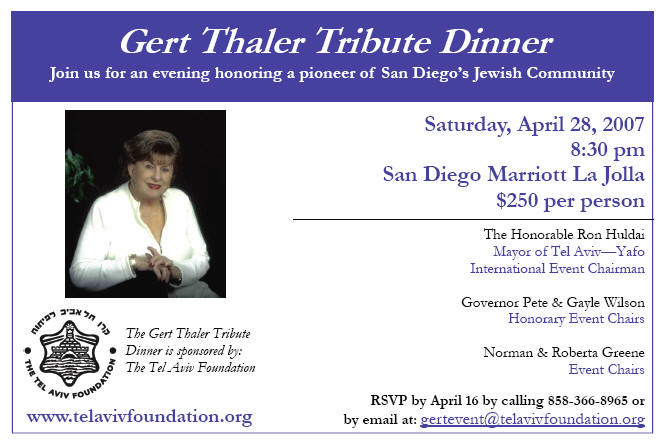
---------------------------------------------------------------------------------------------
The Jewish Grapevine

_____________
CONGREGATIONAL CURRENTS—Tifereth Israel Synagogue
has put together a program of three lectures and a visit to the Dead Sea
Scrolls exhibit at the Natural History Museum in San Diego for $75. On
Sunday evening, May 6, the curator of the exhibit, Dr Risa Levitt Kohn,
will tell about the history and archaeology of the scrolls. On
Tuesday,
May 22, as part of the Conservative congregation's Shavuot observances, SDSU
Linguistics Professor Emeritus Zev bar-Lev will tell about the
development of the Hebrew language before the time of the scrolls; and
on Thursday, June 14, Rabbi Leonard Rosenthal, will tell of religious
life during the second temple period. Series-goers will visit the Dead
Sea Scroll exhibit on Sunday, July 29, following a dairy lunch at the
museum. Information may be obtained from the synagogue office
at (619) 697-6001.
ORGANIZATIONAL NEWS —Rockville, Maryland, is close to Washington D.C., but that's not
where the Jewish world is at. So MyJewishLearning.com has
relocated to New York City. MJL
editor-in-chief
Daniel Septimus commented: "New York
City is the
home of a long tradition of Jewish publishing and remains a
vital
center. MJL belongs here. As the
first organization to create a major pluralistic
educational website for Jews
of all backgrounds and
orientations, we remain committed to that
mission and to
delivering content on the Jewish topics of greatest
interest to the
Jewish world and the general public.”
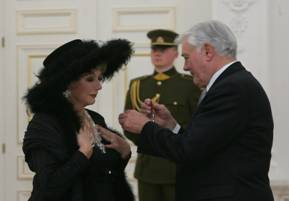 MAZAL
TOV—To actress Ruta Lee, who recently received a letter of
commendation MAZAL
TOV—To actress Ruta Lee, who recently received a letter of
commendation
from Lithuania's President Valdus Adamkus.
Lee has been admired by reform-minded
Eastern Europeans ever since she persuaded
Nikita Kruschchev back in 1964 to allow her 90-year-old grandmother to leave
Siberia.
National Jewish Democratic Council
calls on Republicans to rebuke Novak
WASHINGTON (Publicity Release) – Today, the National
Jewish Democratic Council (NJDC) called on Republican party leaders to
offer a public rebuke of right wing pundit Bob Novak’s harsh
anti-Israel stance and string of unbalanced columns.
In recent columns Novak has suggested Israel’s policies
are
“worse than apartheid,” implied that Israel is oppressing Christians,
claimed that terror organization Hamas wants peace, and chastised
President Bush for failing to pressure the Israeli government.
[Washington Post, 4/9/07, 4/16/07 and 4/5/07]
“This is a major example of Republican hypocrisy,” said
NJDC
Executive Director Ira Forman. “Republicans jump up and down and
paint Democrats with a broad brush whenever anyone on the left says anything
remotely |questionable about the Middle East. Yet, here is right wing
pundit Bob Novak writing a series of awful columns and the silence from
Republican leaders is deafening.”
Novak has a long history of unbalanced reporting on
Israel. In 2001 he referred to Hamas terrorists as “freedom fighters” and
in April 2005, he wrote a column accusing the Israeli government of “walling
off Christianity,” a theme he has repeated in multiple column. Novak has
also blamed Israel for the Iraq war. [Newsday, 12/7/01; Townhall.com
4/18/05; CNN 12/23/03]
“Why are Republicans afraid to stand-up to Bob Novak?”
continued Forman.
Democrats from former President Bill Clinton to Speaker
Nancy Pelosi to
NJDC have publicly distanced themselves from people like Jimmy Carter,
who have taken an unreasonable position on Middle East politics.
Republicans
are apparently afraid to do the same and stand up to influential
conservative Bob Novak.
A fact sheet (prepared by the NJDC) on Novak’s recent anti-Israel
writings follows.
April 16, 2007: Novak writes that Hamas is “calling for
peace” in a
column criticizing the Bush administration for refusing to meet with
terrorist organization Hamas. “On April 2007, ending a seven-day visit
to Israel, I finally got an interview I had sought for a year. I sat down
in a Palestinian Authority office in Ramallah with a leader of Hamas, the
extremist organization that won last year's elections. This leader pushed
a two-state Israeli-Palestinian solution and deplored suicide bombers.
But officials in Washington seem not to want to hear Hamas calling for
peace.” Washington
Post, 4/16/07,
April 9, 2007: Novak suggests that Israel’s policies
are “Worse than Apartheid.” The Washington Post’s headline
for his piece read
“Worse than Apartheid?,” and Novak wrote: “Jimmy Carter raised
hackles by titling his book about the Palestinian question ‘Peace Not
Apartheid.’ But Palestinians allege this is worse than the former South
African racial separation.” Washington
Post, 4/9/07
April 9, 2007: Novak implies that Christians are
oppressed by Israelis.
“Contact with the PFLP is not a requirement for being holed up by the
Israel Defense Forces. Bethlehem University students cannot get to
Jerusalem, a few minutes' drive away, unless they sneak in illegally ….
RepublicanRep. Chris Smith of New Jersey was at the university the
same day I was …. Smith later was given a tour of Jerusalem to see
with his own eyes that the separation barrier in most places is a big, ugly
and intimidating wall, not merely a fence … Smith, an active Catholic
layman, was drawn here because of the rapid emigration of the Holy
Land's Christian minority. They leave more quickly than Muslims
because contacts on the outside make them more mobile. Peter Corlano,
a Catholic member of the Bethlehem University faculty, told Smith
and me: "We live the same life as Muslims. We are Palestinians.
Concerned by the disappearance of Christians in the land of
Christianity's birthplace, Smith could also become (as I did) concerned
by the plight of all Palestinians. If so, he will find precious little
company in Congress.”
Washington Post, 4/9/07,
April 5, 2007: Novak blames Israel – not terror group
Hamas – for breakdown in the peace process. “The aphorism (originated by
Israeli statesman Abba Eban)that Arabs "never miss an opportunity to miss
an opportunity" now can be applied to Israel. Last week's Riyadh declaration
indicated the willingness of the Arab world to consider a peaceful solution.
Now, belief here among peace-seekers is that nothing
will happen until a new president enters the Oval Office in 2009.”
Washington Post, 4/5/07
April 5, 2007: Novak wants Bush to pressure apply
pressure on
Olmert without calling for reciprocal pressure on the Palestinians.
“Nothing could beaccomplished now without Bush pressuring
Olmert.” Washington Post,
4/5/07
April 18, 2005: Novak accuses Israel of “Walling off
Christianity.”
Rep. Henry “Hyde's tone is markedly softer than the desperate voices
of Christian clergy who find themselves cut off by Prime Minister
Ariel Sharon's security wall. Their fear and frustration stems from
their inability to move anybody with power in the Bush administration
and very few members of Congress.”
Townhall.com, 4/18/05
December 23, 2003: Novak blames Israel for the Iraq war.
From
a CNN interview:
WOLF BLITZER: Was the
president sold a bill of goods
on Iraq?
NOVAK: I think they got in a mindset where they really
wanted change of government, and then it was a need to
find reasons for a change of government.
BLITZER: Why was that?
NOVAK: I believe that they felt that this was the key to
American foreign policy. I think it was -- they thought it was
very important to our ally, Israel, to get rid of him, to [have]
peace in the Middle East, and then you kind of think of reasons
to get it done.
CNN,
1/17/07
November 2001: Novak refers to Hamas terrorists as
“freedom fighters.” From former NYC Mayor Ed Koch’s column in
Newsday:
Two weekends ago, I watched 'Capital Gang' on CNN, featuring
Robert Novak … On his Nov. 24 show, Novak went ballistic in his
ill will toward Israel. While discussing the Israeli assassination of
Mahmoud Abu Hanoud, a senior military leader of Hamas on the
West Bank directly responsible for dozens of Israeli civilian deaths,
Novak denounced Prime Minister Ariel Sharon for ordering Hanoud's
assassination. Novak's colleague, Margaret Carlson, rightly called
Hanoud a terrorist, and Novak defended him as a freedom fighter.
Carlson responded, "Bob, you're the only person who would call Hamas freedom
fighters. ‘Oh, no,’ Novak rejoined. ‘People all over the world do.’" Ed
Koch, Newsday, 12/7/01
------------------------------------------------------------------------------------0
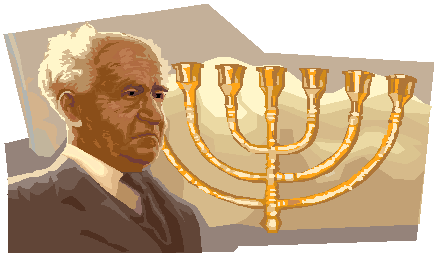 Jews
in the News
------------------------------------------------------------- Jews
in the News
-------------------------------------------------------------
News spotters: Dan Brin in Los Angeles, Donald H.
Harrison in San Diego, Marsha
Sutton in North San Diego County. To see a
source story click on the link within the
respective paragraph.
_______________________________________________________________________
*Elliott Abrams, the deputy national security adviser, is
upbraided
in a column today by Robert D. Novak, for failing to schedule an
appointment so Novak could report in-depth to him on his recent
visit to
Palestine and the peace overtures that Novak believes
Hamas is making toward
Israel. The
column appears in today's
San Diego Union-Tribune.
*Larry King, in the midst of a week-long celebration on CNN of
his 50
years in broadcasting, is 73, has a heart ailment, and shows
no sign of
slowing down. Jacques Steinberg of the New York
Times News Service
tells
the story in today's San Diego Union-Tribune.
*Ficus trees are beautiful, provide plenty of shade, but they also
crack
streets and sidewalks. A plan by the City of Commerce to
remove many
of them has Andy Lipkis, TreePeople's founder,
quite concerned. Debora Schoch
reports in today's Los Angeles Times.
*Ilan Ramon, the Israeli who died with other astronauts in the
2002 explosion of the Columbia Space Shuttle, will be among
those having
a
permanent place of memorial at a new education
center in the former Rockwell
International plant in Downey.
Alicia Chang of the Associated Press tells
the
story in
today's San Diego Union-Tribune.
*Jerry Seinfeld and Jackie Mason can tell Jewish
jokes
with impunity because they are insiders; but we are likely to
be
offended when non-Jews tell them, columnist Paul Brownfield
writes in today's Los Angeles Times.
*Los Angeles County Supervisor Zev Yaraslovsky is studying
a
proposal to make Olympic and Pico Boulevards each one-way,
a move that
transportation planner Allyn D. Rifkin believes
could improve
commuter traffic efficiency by 20 percent.
Jean Guccione has
the story in The Los Angeles Times. |

